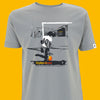Paul GascoigneInkblot #19
Paul John Gascoigne (born 27 May 1967, Dunston, Gateshead, England), commonly referred to as Gazza, joined Newcastle United as an apprentice in 1983. His talent as a youngster was recognised by manager Jack Charlton who handed him his full first team debut in 1985. He spent three more years at St James' Park where he won the PFA Young Player of the Year Award in 1988.That same year, Tottenham fought off Manchester United's advances to sign the midfielder for a British-record of £2.3 million. His skilful performances earned him a place in Bobby Robson's England squad for the 1990 World Cup where he was to wear the #19 shirt.
On 4th July 1990, England played West Germany in the World Cup semi-final in Turin. Gascoigne was booked, and having picked up a yellow card in an earlier game it meant he would be suspended for the World Cup Final if England progressed. Television showed that he had tears in his eyes following the referee’s decision. After full time the game was decided on penalties but Paul didn't feel that he was in a fit state to take his. The Germans eventually won the shoot-out and England failed to reach the final. His tearful reaction bewitched the watching millions, invigorated the national game and sparked what became known as Gazzamania. His inspirational performances earned him a place in the All-Star team of the tournament. He was awarded further praise and a coveted accolade that same year when he was named BBC Sports Personality of the Year 1990.
Gascoigne's domestic career went on to include spells at, Lazio, Glasgow Rangers, Middlesbrough, Everton and Gansu Tianma in China. Always in the media spotlight, his 'off-the-field' antics were self-destructive, recurrent and damaging. He was to pay a heavy price, as he found himself omitted from Glenn Hoddle's England squad for the 1998 World Cup. In his autobiography, he disclosed details of having undergone therapy for bulimia, obsessive-compulsive disorder, bipolar disorder, and alcoholism. An issue central to Gazza's decline as an athlete, and increasing mental health problems, was his inability to occupy himself when not able to play football.
Inkblot #19 suggests an idea of an underlying butterfly effect that stems from his infamous booking in Turin? Was this the first 'flap of a butterfly’s wings' that was responsible for both a physical and mental tornado in the life of one of the most naturally gifted midfielders of his generation?
Inkblot
Test: 'A
psychological test in which subjects' perceptions of inkblots are
recorded and then analyzed using psychological interpretation.'
Hermann
Rorschach
'I
just turned to Bobby Robson and said keep an eye on him, have a word
with him, he’s basically lost the plot.'
Gary
Lineker
'He
looked mental, torn up, cut to the heart and the knife twisted hard.'
Pete Davies –
One Night in Turin
Butterfly
Effect: 'Predictability:
Does the Flap of a Butterfly's Wings in Brazil set off a Tornado in
Texas?'
Edward
Lorenz
'I never predict anything, and I never will.'
Paul
Gascoigne












